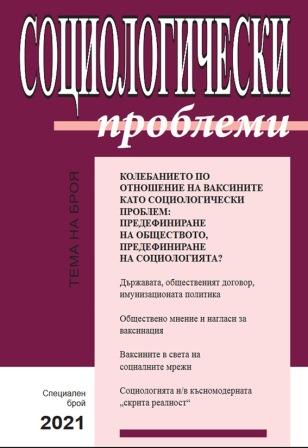Национална държава и знание в Късната модерност: „скритата реалност“, параноя и конспиративни теории. Проблемът за социологическата експертиза
Nation-State and Knowledge in Late Modernity: „Hidden Reality“, Paranoia, and Conspiracy Theories. The Nation-State Perspective Problem of Sociological Expertise
Author(s): Ivan Tchalakov, Bilyana Mileva, Irina PopravkoSubject(s): Social Sciences, Sociology, Health and medicine and law, Social Informatics, Social Norms / Social Control
Published by: Институт по философия и социология при БАН
Summary/Abstract: The paper continues the analysis of the conditions behind the current growth of vaccine hesitance, started earlier by the authors. Thirty years after the beginning of the transition to a market economy and democratic political system, the growth of vaccine hesitancy in Bulgaria and other Eastern European countries, especially during the COVID-19 pandemic, might be considered as an effect of the end of this transition. According to Luc Boltanski’s model of the capitalist democratic nation-state and its evolution, social phenomena such as paranoid distrust of institutions, resentment, and conspiracy thinking are also emerging in Eastern Europe. However, the authors argue that the legacy of the decades of communist rule in these countries (including its failure) reinforce these typical for the capitalist nation-states phenomena, while at the same time significantly modifying them. For example, in Eastern Europe there is a particularly strong distrust in modern natural and social science, against the background of persistent deficits in the understanding and application of modern law as a regulator of relations between autonomous social actors. In this context, the article concludes with an attempt to outline the challenges sociology faces in the attempt to understand causality in late modern societies where the complex interactions between natural, technical and social (in the narrow sense) actors often produce unexpected and unintended effects, where the reduction of causality to intentionality feeds paranoid and conspiratorial thinking (both in sociology and the social actors it studies).
Journal: Социологически проблеми
- Issue Year: 54/2021
- Issue No: Special
- Page Range: 162-199
- Page Count: 38
- Language: Bulgarian
- Content File-PDF

